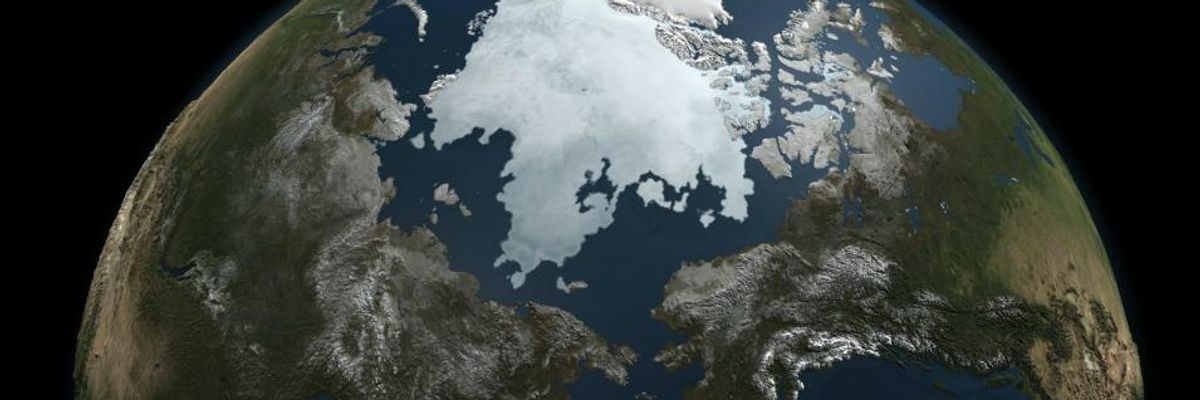The latest United Nations report on the threat of global warming - by far the most serious warning ever of possible environmental disaster - faces a string of serious hurdles to overcome during the next 13 months if the world's nations are to sign a new, binding climate pact at the end of 2015.
The Intergovernmental Panel on Climate Change's (IPCC) hard-nosed report, released in Copenhagen on Sunday, describes in detail the disaster ahead unless humankind can perform a near miracle by reversing carbon emissions by 2020 and then phase out emissions entirely by the end of this century.
The document was finalized following a week of sometimes acrimonious discussion between scientists and officials from countries such as the United States and Canada with large fossil fuel reserves which were only slightly successful in having some of the report's tough language removed.
The report was prepared to provide up-to-date information for governments attempting to deliver a new global treaty on climate change during a final UN Climate Summit scheduled for Paris in December 2015.
The IPCC offers hope for the future of the planet by saying that if the right solutions are put into place there can be continued economic and human development.
However, considering the severity of the report And its political implications, it is questionable how much progress can be made because of a number of difficulties that must be overcome.
To begin with, the UN lacks the power to force governments to follow any particular course of action. While UN Secretary-General Ban Ki-moon sounds like he is in charge of a solid campaign for change, he's really a concerned cheerleader. Moreover, Sunday's report includes only vague suggestions concerning actions that should be taken to slow global warming. It says that:
Most of the world's electricity should be produced from low-carbon sources by 2050;
Renewables will have to grow from the current 30 per cent share to 80 per cent of the power sector by 2050;
Fossil fuel power generation without carbon capture and storage (CCS) technology would need to be phased out almost entirely by 2011. However, the world has only one CCS plant in operation as the technology has not proven to be reliable; and
Perhaps in keeping with the desperate situation facing the UN, it meekly offers that behavioural changes, such as eating less meat, can have a role in cutting emissions.
One on-going political issue concerns to what extent wealthy countries, which are responsible for much of the climate destruction to this point, are willing to assist less developed nations in covering the costs of mitigating the damage caused by climate change.
An important step was taken last week when the UN finalized the formation of the Green Climate Fund (GCF), which is receiving pledges of funds that will be used to launch climate projects in developing countries. The target set at the 2009 Copenhagen Summit was to raise $100-billion by 2020. However, pledges have been slow to come in so the UN now hopes governments and the private sector will commit $15-billion as starter capital.
The UN is keeping a close eye on somewhat acrimonious discussions underway between the United States and China over reducing the burning of coal, which is the world's dirtiest polluter. If the two super-powers cannot reach an agreement, some countries may be reluctant to sign onto a binding deal next year.
Another issue concerning the U.S. is whether President Obama, who no doubt would like to boost his legacy with a global climate agreement, will have the power to sign an agreement in Paris. In September, members of the Senate, many of whom receive large donations from carbon-producing corporations, refused to sign the U.S. onto a special declaration. It called for the establishment of a global price on carbon that would penalize industries for excessive carbon emissions.
President Obama almost certainly will need the backing of the Senate if he is to sign the U.S. on to a full agreement next year.
Lurking in the background are powerful corporations that would lose trillions of dollars and be forced to re-think their future if the drastic measures called for by the IPCC are implemented.
The Corporate Europe Observatory (CEO), which monitors corporate power in Europe, claims that "dirty energy corporations" will try to hijack the next round of UN climate negotiations, scheduled for Peru next month. "Some of the most polluting corporations and their lobby groups are trying to prevent governments from endorsing effective climate action and instead promoting false solutions like dirty coal and carbon markets," says the group.
In fact, corporate participation in the climate discussions is coordinated by the UN Global Compact , a powerful business lobby that looks out for the interests of corporations across a number of UN program areas. Many of the corporations come from the energy sector.
Despite the obstacles ahead, a group of leading non-governmental organizations optimistically issued a report in September outlining what they believe needs to come out of the Paris Summit.
The NGO report says that, among other things, a new agreement needs to include: a clear signal to businesses to steer investment toward low-carbon outcomes; ambitious action before and after 2020; a strong legal framework with clear rules for compliance; a central role for equity among countries; considerable public finance for adaptation; and a framework for action on deforestation and land use.
The next round of discussions will be held in Lima, Peru from December 1 to 12.
